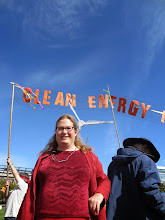
Forty years ago, Congress passed significant amendments to the 1963 Clean Air Act.
Today, Americans still have electricity created from particulate-producing fossil fuels. Coal and natural gas both create pollution when burned. Smokestacks have scrubbers, but the sulfur dioxides and nitrogen oxides are still created.
So often the focus of renewable energy is on transportation fuel and the limited supplies of fossil fuels and the problems of securing domestic supplies over imported supplies.
But what about the fossil fuels burned to power homes, business and industry?
Can a healthy economy have power and clean air?
The Solar Gardens Institute says Yes, and offers a sustainable solution.
Solar-generated electricity creates no emissions once installed.
Community solar power, through solar gardens, enhances neighborhoods by having clean, sustainable locally- generated power without simply displacing the pollution effects to other locations.
Particulate emissions aggravate asthma symptoms in sensitive people. Ozone damage from power plant emissions can increase skin cancer rates.
Colorado passed a community solar gardens act last session and Public Utilities Commission rules on utility rebates should be out Oct. 1.
Anybody can own a panel or more, in a community solar garden. A solar garden is a small to medium sized array, everything from panels on a neighbor's roof, a nearby commercial or industrial building, or on open land. Typically, a person can own a panel, or the output of a panel in a community solar garden.
If your trees shade and cool your roof, if you rent, if you are in a restrictive HOA, if you live in a condominium complex, community solar gardens open the world of sustainable solar to you.
Community solar is a less-expensive way to generate and use clean energy where it is needed, with fewer high tension transmission lines.
“A solar garden, or community owned solar array, helps clean the air by replacing fossil fuel generation,” said Joy Hughes, founder of The Solar Gardens Institute and Solar Panel Hosting Company. “By keeping money local, a solar garden can help support local food production and markets, schools, and libraries. This helps people meet their needs locally and drive fewer miles.”
Studies show that each dollar spent in a local business circulates through the economy three times.
Money spent with a non-local business leaves the local economy immediately.
Visit www.solargardens.org for more information about starting or joining a solar garden in your community.
Photo by Robyn Lydick


No comments:
Post a Comment